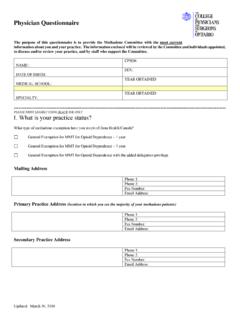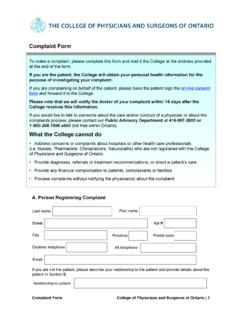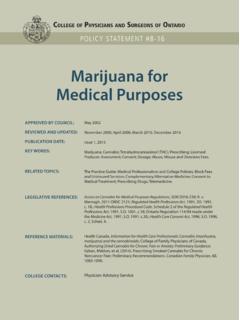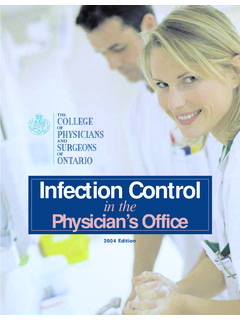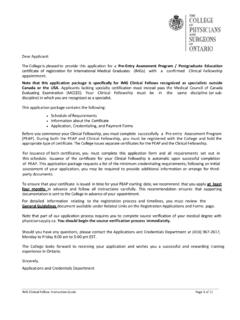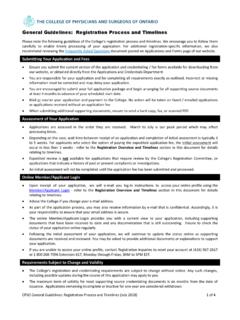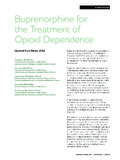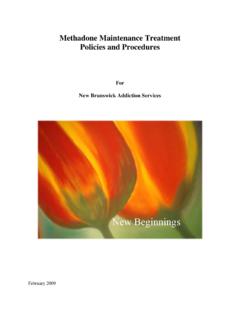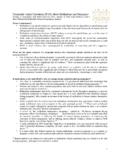Transcription of Methadone Maintenance Treatment
1 Methadone Program Methadone Maintenance Treatment Program Standards and Clinical Guidelines 4th Edition February 2011 2 Methadone Maintenance Treatment Program Standards and Clinical Guidelines These guidelines are in effect as of February 2011 This document may be reprinted and distributed in its entirety for non-commercial purposes without permission, but permission must be obtained to edit its content. Wade Hillier Associate Director, Practice Enhancement and Assessment College of Physicians and Surgeons of Ontario 80 College St., Toronto, Ontario M5G 2E2 Telephone: (416) 967-2661 Email: Methadone Maintenance Treatment Program Standards and Clinical Guidelines 3 The College of Physicians and Surgeons of Ontario - 2011 The College of Physicians and Surgeons of Ontario Vision Statement Quality Professionals, Healthy System, Public Trust Our Mandate Build and maintain an effective system of self-governance.
2 The profession, through and with the College, has a duty to serve and protect the public interest by regulating the practice of the profession and governing in accordance with the Regulated Health Professions Act. Our Vision Defined Quality Professionals, Healthy System, Public Trust. Our new vision is the framework by which we organize ourselves. It guides our thinking and actions into the future. It defines not only who we are, but what we stand for, the role we see for ourselves, our critical relationships, in what system we work, and the outcomes we seek. Each component of our vision is defined below: Quality Professionals as a profession and as professionals, we recognize and acknowledge our role and responsibility in attaining at a personal, professional, and at a system-level, the best possible patient outcomes. We are committed to developing and maintaining professional competencies, taking a leadership position on critical issues that impact the performance of the system, and actively partner to provide tools, resources, measurement, to ensure the optimal performance at all levels of the system.
3 Healthy System the trust and confidence of the public and our effectiveness as professionals is influenced by the system within which we operate. Therefore, we, as caring professionals, are actively involved in the design and function of an effective system including: accessibility the interdependence of all involved measurements and outcomes continued sustainability 4 Methadone Maintenance Treatment Program Standards and Clinical Guidelines Public Trust as individual doctors garner the trust of their patients, as a profession we must aim to have the trust of the public by: building positive relationships with individuals acting in the interests of patients and communities advocating for our patients and a quality system Our Guiding Principles Integrity, accountability, leadership and cooperation The public, through legislation, has empowered the profession to regulate itself through the College. Central to the practice of medicine is the physician-patient relationship and the support of healthy communities.
4 As the physician has responsibility to the patient, the profession has the responsibility to serve the public through the health-care system. To fulfill our vision of quality professionals, healthy system, public trust we will work to enhance the health of the public guided by professional competence and the following principles: Integrity in what we do and how we go about fulfilling our core mandate: Coherent alignment of goals, behaviours and outcomes; Steadfast adherence to a high ethical standard. Accountability to the public and profession we will achieve this through: An attitude of service; Accepting responsibility; Transparency of process; Dedicated to improvement. Leadership leading by proactively regulating our profession, managing risk and serving the public. Cooperation seeking out and working with our partners other health-care institutions, associations and medical schools, etc. to ensure collaborative commitment, focus and shared resources for the common good of the profession and public.
5 Methadone Maintenance Treatment Program Standards and Clinical Guidelines 5 The College of Physicians and Surgeons of Ontario - 2011 TABLE OF CONTENTS ACRONYMS .. 13 1. Preface .. 14 Role of the CPSO in MMT .. 14 Role of the Guideline Advisory Committee .. 14 Guideline Advisory Group Members .. 15 Role of the Research Advisory Group (RAG) .. 15 Research Advisory Group Members .. 15 Standards and Guidelines .. 16 Evidence Synthesis Methods .. 16 Literature Search Methods: .. 17 Rating Quality of Evidence .. 17 Summary of Evidence Synthesis Key Findings .. 17 2. Introduction .. 19 History of MMT in the Treatment of Opioid Dependence .. 19 Effectiveness of Methadone .. 21 Professional Duties .. 22 Interprofessional Collaboration (IPC) .. 22 Physician-Pharmacist Collaboration and Communication .. 22 Physician-Patient-Pharmacist 3-Way Treatment Agreements .. 23 Conclusion .. 23 3. MMT Physicians and Practice Settings .. 24 Overview.
6 24 Obtaining a Methadone Exemption .. 24 MMT Physician Practice Settings .. 24 Primary Care MMT Practice .. 24 MMT-Focused Practice .. 25 Community-Based MMT Practice .. 25 Hospital and Corrections-Based MMT Practice .. 25 4. Pharmacotherapy Options other than MMT for Opioid Dependence .. 26 Overview .. 26 6 Methadone Maintenance Treatment Program Standards and Clinical Guidelines Abstinence Based Treatments .. 26 Indications for Abstinence Based 26 Pharmacotherapy for the Systematic Treatment of Opioid Withdrawal .. 27 Table 01: Withdrawal Management .. 27 Opioid Agonist Treatment .. 27 Buprenorphine .. 27 Indications for Buprenorphine Treatment .. 28 Buprenorphine: Practical Issues .. 28 Conclusion .. 29 Table 02: Consideration of Factors for Buprenorphine vs Methadone vs Abstinence-based Treatment .. 29 5. Initial Patient Assessment .. 29 Overview .. 29 Suggested Criteria for MMT .. 30 Adolescents .. 31 Assessing a Patient for MMT Initiation.
7 31 Patient History .. 31 Table 03: Patient Factors that Increase Risk of Methadone Toxicity .. 32 Elderly .. 32 Focused Physical Examination .. 32 Urine Drug Screening (UDS) .. 32 Other Tests .. 33 MMT Program Documentation .. 33 CPSO Registration .. 33 Treatment Agreement .. 34 6. Dosing During Initiation, Stabilization and Maintenance .. 34 Overview .. 34 Writing a Methadone Prescription .. 37 Strategies to Reduce Risk of Overdose .. 38 Clinical Criteria for Dose Adjustment .. 39 Table 04: Withdrawal Symptoms .. 39 Documentation for Dose Adjustments .. 39 The Initial Methadone Dose .. 40 Table 05: Initial Methadone Dose .. 40 Early Stabilization Phase (0-2 weeks) .. 40 Table 06: Dosing During Early and Late Stabilization Phase .. 40 Missed Doses During Early Stabilization Phase (0-2 weeks) .. 41 Late Stabilization Phase (2-6 Weeks) .. 41 Dosing During Late Stabilization Phase .. 41 Missed Doses During Late Stabilization Phase.
8 41 Methadone Maintenance Treatment Program Standards and Clinical Guidelines 7 The College of Physicians and Surgeons of Ontario - 2011 Maintenance Phase (6+ Weeks): The Optimal Methadone Dose .. 41 Missed Doses During Maintenance Phase .. 42 Doses Below 60 42 Doses Above 120 mg .. 42 Table 07: Risk Factors for QTc Prolongation in Patients on Methadone .. 43 Split Doses .. 44 Managing Missed Doses .. 44 Table 08: Management of Missed Doses .. 45 Vomited Doses .. 45 Urine Drug Screening (UDS).. 46 Overview .. 46 Initial UDS .. 47 Table 09: Point-of-Care Testing (EMIT) vs Chromatography .. 48 UDS Collection Schedule .. 48 Frequent UDS during Stabilization Phase .. 48 Frequency of UDS during Maintenance Phase .. 48 UDS Frequency during Relapse or Return to Drug Use for Patients on Take-home Doses .. 49 Take-Home Doses .. 49 Overview .. 49 Take-Home Doses: Risks .. 52 Diversion .. 52 Locked Box .. 53 Take-Home Doses: Criteria.
9 53 Table 10: Problematic versus Non-problematic Drug Use .. 53 Take-Home Dose Acquisition Schedules .. 54 First Take-Home Dose .. 54 Sunday Dosing .. 54 Subsequent Take Home Dose Acquisition .. 54 Accelerated Take-Home Schedule .. 55 Take-Home Doses in Exceptional Circumstances ( Special Carries ) .. 55 Table 11: Criteria for Prescribing Exceptional Take-Home Doses .. 55 Reducing Take-Home Doses .. 55 Relapse to Problematic Drug Use .. 55 Reducing or Cessating Take-Home Doses for Reasons Other than Substance Use .. 56 Take-Home Doses for Patients on Benzodiazepines or Opioids .. 57 Routine 13 Day Take-Home Doses for Work Commitments .. 57 8 Methadone Maintenance Treatment Program Standards and Clinical Guidelines Voluntary and Involuntary Withdrawal from MMT .. 57 Overview .. 57 Voluntary Withdrawal .. 58 Involuntary Withdrawal .. 59 Indications for Involuntary Withdrawal .. 59 Process for Involuntarily Withdrawing a Patient.
10 59 Counselling and Case Management .. 60 Overview .. 60 Treatment Team .. 60 Case Management .. 61 Therapeutic Factors .. 61 Extra Therapeutic Factors .. 62 Therapeutic Relationship .. 62 Concepts of Recovery .. 63 Counselling Techniques and Skills .. 63 Community Resources .. 64 MMT with Concurrent Mental and Physical Disorders .. 64 Overview .. 64 Physical Disorders .. 66 Infectious Disease .. 66 At-Risk Drinking .. 66 Hepatic, Renal, and Respiratory Disease .. 66 Acute Pain .. 67 Chronic Non-Cancer Pain .. 67 Table 12: Overview of Pain Management .. 68 Mental Illness .. 69 Anxiety and Mood Disorders .. 69 Benzodiazepines .. 70 Methadone Toxicity .. 70 Overview .. 70 Dosing and Assessment for Possible Methadone Toxicity .. 71 Patient Referral to the Emergency Department for 72 Refusal to go to Emergency Department .. 72 Methadone Maintenance Treatment Program Standards and Clinical Guidelines 9 The College of Physicians and Surgeons of Ontario - 2011 MMT Considerations during Pregnancy.
